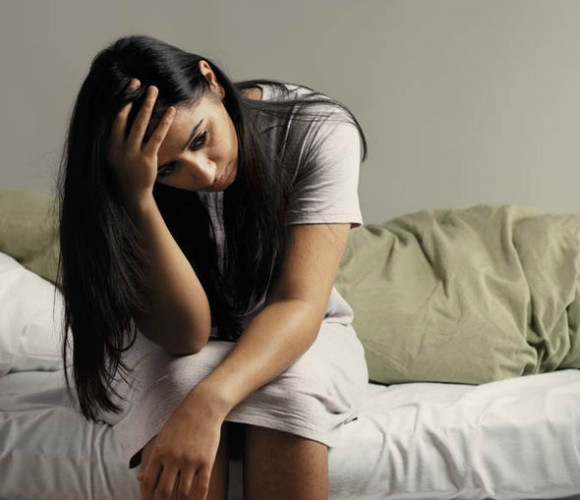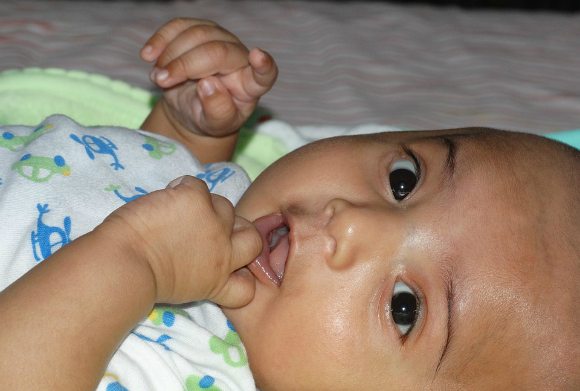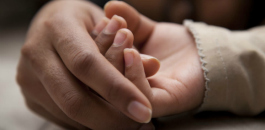"Some see depression as wrong and a weakness. I disagree and see it as a medical illness"
Postnatal depression affects women of all cuts and creeds worldwide, however, in the South Asian community it can be an experience tainted with stigma and duty.
This is due to the cultural expectations of women in these communities to be maternal and ‘power through’, as they not encouraged to talk about issues of emotional distress.
The NHS defines Postnatal Depression (PND) as ‘a type of depression some women experience after having a baby’.
It develops in the first 6 weeks after giving birth, and women of all ethnic groups and childbearing ages can be affected by it.
According to The Royal College of Psychiatrists: “Postnatal Depression is a depressive illness which affects between 10 to 15 in every 100 women having a baby.”
It’s something that goes unnoticed as the symptoms can be misread as something normal after giving birth, like mood swings and difficulty sleeping.

Sara, an Asian mother of 4 tells us: “Views vary from person to person. Some see depression as wrong and a weakness in faith. I disagree and see it as a medical illness, like diabetes.
“It’s a chemical imbalance that needs treatment, therapeutic (lifestyle change) or depression tablets in severe cases.”
There’s also pressure stemmed from the elders, for women to be appear perfect for the sake of the community. If anyone deviates from the norm, the first thing they ask is, ‘What will people think/say?’
The expectation of women to be maternal, caring figures also helps to create a stigma when it comes to postnatal depression. As it’s hard for new mothers to ask for help when they don’t feel the way mothers ‘should’ do.
As a result of this, it would seem to many that women from these communities don’t experience postnatal depression at all, and that is a very dangerous misconception.
Sakina, 24 says: “It’s very commonplace to ignore problems that people go through and just act like nothing’s wrong. Especially when it comes to mental disorders, which are often misunderstood or even ridiculed because of the lack of knowledge or even ignorance.”
“It’s more attributed to being caused by supernatural elements rather than the disorders of the psyche,” she adds.

Rima, 22, explains: “Many mothers within the South Asian community go undiagnosed when it comes to postnatal depression.
“It’s viewed as more of a ‘suffer in silence’ sort of illness rather than something that requires the support of others or sometimes even a doctor.
“Although it is very common, to be seen as a anything other than happy after giving birth can often be belittled or ridiculed within the family or community.”
The way in which the South Asian community sees women is with the patriarchal lens, that she should be meek, mild and maternal.
Integrative and Islamic counsellor, Zaynah Plummer Josephs tells DESIblitz:
“The stigma on mental health within the South Asian community is a very hush hush thing, you don’t really talk about it as it’s seen as a very embarrassing thing. But mental health issues such as feeling depressed, or anxiety are just the same as any physical illness.

“Especially postnatal depression, it is a chemical imbalance in the brain, and very often there is a surge of hormones, so lots of things are going on for mother.”
If the mother does not fit the mould of being maternal and dutiful, there are calls for controversy, and that’s one of the main reasons postnatal depression tends to stay under the radar.
If a woman dares to admit that she’s feeling aggression towards her child, or is feeling very depressed, then she would be ‘failing her duties’ as a woman, a wife and a mother:
“I think it goes unnoticed in a lot of communities, and I’m not sure why to be honest,” Zaynah continues.
“The reasons might be social. Sometimes we live in extended families, and as a result they might not notice because mum and grandmother is taking care of the baby.
“Sometimes I’ve had a few clients, where they’ve just totally ignored it and denied it, and feel embarrassed and kind of expect the mother to carry on as normal.”
Due to these thoughts, postnatal depression can lead to domestic violence because of the misunderstandings and a general lack of education:
“A few of my clients have suffered from postnatal depression and it’s not been picked up by the family, and as a result the husband has become quite violent towards them.

“A few of them have actually been here [UK] and they’re graduates, they’ve lived a very active life.
“Then when they have the baby and have postnatal depression and some of those husbands have been very violent towards them, because they see that change and they can’t understand it.”
“So the big pressure on most of the South Asians are with the women who actually live with their in laws, to get on with everyday life and help their in laws.
“So some of them have been really horrible towards them, and some of their own mothers have thought that if she doesn’t shape up quickly, then it will be a bring shame and they’ll lose face in their own community,” Zaynah adds.
The older generation also play a huge role in the stigma as they are the in-laws and raising their family in such a way that mental health issues are dismissed.
In some cases mothers can be subject to domestic violence in their homes. Mother-in-laws and even mothers are reluctant to show support to daughters who have given birth. Sadly, they are expected to just ‘get over it’.

“These thoughts of maybe harming themselves and sometimes even the baby. A lot of the older generation see it as maybe people are jealous or the evil eye and stuff like that.
“Or they just don’t understand and they think the mother is lazy and they think, ‘Get over it, we’ve had so many children, we got on with it’.”
Where to Get Help:
- Pandas Foundation: http://www.pandasfoundation.org.uk/
- Apni: http://apni.org/
- Muslim Counsellors Britain: http://www.muslimcounsellorsbirmingham.co.uk/
- PNI: http://www.pni.org.uk/
- BACP: http://www.bacp.co.uk/
Helplines:
- Samaritans: 08457 90 90 90
- SANEline: 0845 767 8000
- NHS Direct: 111
In general, there is a greater need for education on mental health issues, and in this case postnatal depression.
Sadly, for many British Asian women suffering from this illness, very little support is given to them. It is vital that they seek help and parents and elders of the community know what to look out for it.






























































